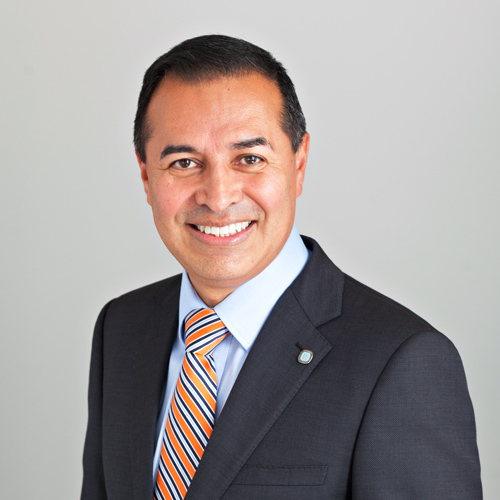In third grade, Jorge Morales’s father, Cirilo, left school to find work and help his family. His wife, Amalia, did the same thing in sixth grade. Cirilo didn’t want the same for his children, though, so one day he took his ten-year-old son to work with him at a farm to give him a taste of what life would be like without an education. After hours of pulling weeds to prepare the fields for growing cotton, lettuce, and cauliflower, Morales was forever changed.
“I was always trying to get out of going to school, but I never forgot that day, and I swore I would never do that again,” says Morales, who was born in San Luis, Mexico, and raised in Somerton, Arizona. “My father did the same thing with my five siblings. We are all college graduates, plus my three sisters also have master’s degrees.”
Morales wound up with a bachelor’s degree in electrical engineering from the University of Arizona, and today he’s the senior global director of information technology for TPI Composites. The path that led him there wasn’t completely planned, but now he’s playing a crucial role in the company’s global IT transformation by working to get all team members to adhere to the same standards.
It was in his first job out of college, at Boeing Computer Systems in Washington state, that Morales began to make moves toward IT. Specifically, the shift began when he was tasked with figuring out a monitoring system for a series of huge glass-encased underground tanks meant to store radioactive waste.
“I was asked to create a device to retrieve the data we were compiling from the tanks, but once we had the data, I realized that we needed a way to analyze it, so I developed analytics software,” he says. “That’s when I made the transition from electrical engineering to information technology.”
Not long after, in 2009, Morales came across an ad for TPI while working as a consultant and looking for companies based in Arizona. TPI wanted an IT expert to manage its Oracle enterprise business suite, which Morales already had experience with as a consultant.
“The job description intrigued me,” he says. “I was interested in doing something beneficial for the world by working with clean, renewable energy.”
In the nearly nine years since arriving at TPI, Morales has built its IT team into a tight-knit, troubleshooting machine. He has also worked to change its focus to quality control by standardizing TPI’s global information collection, storage, and analysis procedures as the company continues to expand.
“We needed a process for putting data into a repository in the same manner at all locations so that when we are looking for a report, we can push a button and get the same data from any site.”
—Jorge Morales
When Morales joined in 2009, the company had 2,500 employees and four manufacturing sites. Fast-forward to 2017, and TPI employs 8,500 worldwide at thirteen manufacturing sites, located in Turkey, China, Mexico, and the United States. Morales’s IT team has grown from two people—and a heavy reliance on outsourced work from consultants—to forty around the world who can manage a lot of processes internally. Speaking to all his teams directly requires at least a eleven-hour workday, starting at 7 a.m.
“We run lean,” Morales says. “We don’t write software. We focus on our business goals and then find the technology that fits that need, rather than getting the technology first and then figuring out how to make it work.”
To take the team to the next level, Morales knew he had to do more to ensure everyone was on the same page.
“I realized eighteen months ago that the data we procured was not coming from the same place; we did not have a single source of truth,” he says. “If we wanted reliable data for reporting, we needed a process for putting data into a repository in the same manner at all locations so that when we are looking for a report, we can push a button and get the same data from any site and it can be reproduced. The hope is that if we have a single source of truth, looking at efficiency, we can maximize it globally.”
Morales has also helped TPI work out a contract with another global company, Deloitte, for consulting services. He and TPI wanted to find a similarly sized business with which TPI could share best practices, identify potential gaps in its ongoing processes, and solidify them.
“When we began this process, I had two goals,” Morales says, “make sure we have no doubt where our data is coming from, and train my IT staff globally so that they understand the process and become business partners, solving business issues, not just technology.”
TPI’s transformation will be complete by June of next year, fulfilling the company’s objectives and Morales’s own—far bigger ones than those he began with so many years ago on the farm.

